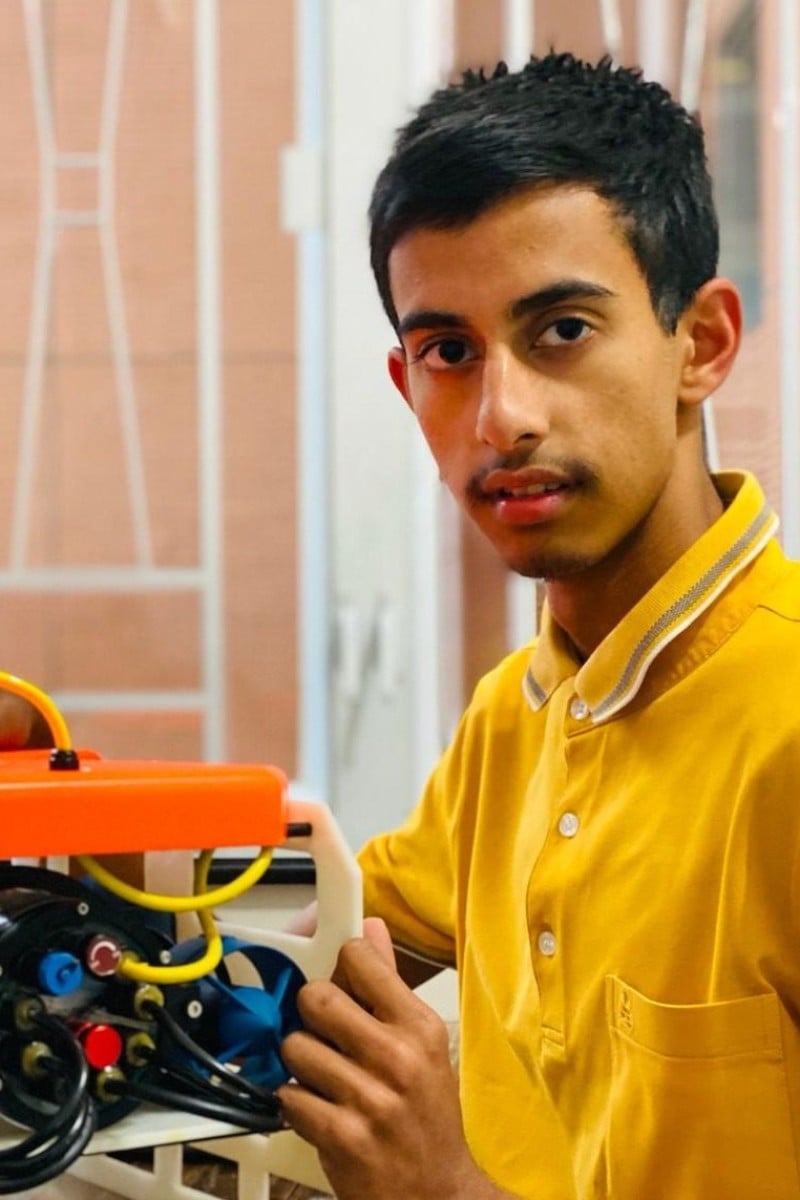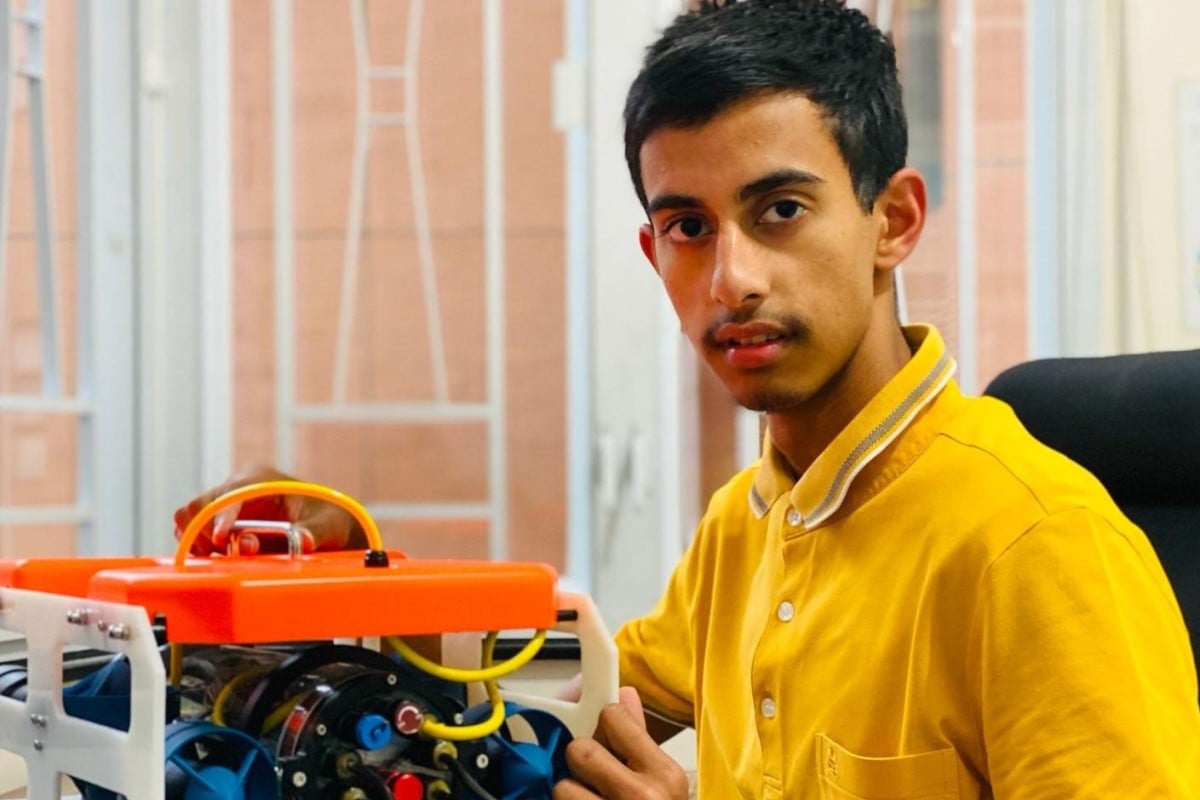
From improving prosthetic arms to cleaning trash from oceans, this Hong Kong teen is engineering a better world
- German Swiss International School student Adhit Ranjan is passionate about using robotics to solve global challenges – and at 17, he’s only getting started
- Every week, Talking Points gives you a worksheet to practise your reading comprehension with exercises about the story we’ve written
 Adhit Ranja hopes to use his talents to improve healthcare in his home state in India. Photo: Handout
Adhit Ranja hopes to use his talents to improve healthcare in his home state in India. Photo: HandoutAmid the doom-and-gloom headlines we often read about the dangers of technology, one 17-year-old Hongkonger is determined to use it to improve lives.
Thanks to his work on a prosthetic arm and an underwater cleaning robot, Adhit Ranjan has been recognised as a winner of this year’s Hong Kong Outstanding Students Award.
The award honours 10 students every year for their achievements in various disciplines, from sports to science and community service. It is organised by the Youth Arch Foundation, a charity that fosters young talent and encourages them to contribute to society.
Adhit – who is a Year 12 student at German Swiss International School – had the chance to work on a remote-controlled prosthetic arm after reaching out to a team at the University of Michigan in the US.
AI robots could play future role as companions in care homes
He explained that existing prosthetics could often be heavy and costly, and they offer low dexterity to those who need them, so “we decided to try and brainstorm solutions into something a bit more optimal”.
The team began by improving how prosthetics’ gears are powered.
“Existing prosthetic designs use a DC motor – a direct current motor – for transmission. We were looking at something [called] CVT, continuously variable transmission ... we realised [it] can offer greater dexterity and a more efficient response time,” he explained.
They spent six months designing the prosthetic arm, and now, they are working on patenting the design and expanding it to other prosthetics.
“I think that CVT can revolutionise the prosthetics industry. It is not only cheaper, but it also offers [increased] mobility,” Adhit shared.
Inspired to help
When he’s not working with university researchers to patent innovative technology, Adhit spends his free time working on an underwater exploration robot that uses cameras to detect and clean waste.
This project was inspired by something he worked on with his school robotics team, of which he has been a member and the chief technical officer for the past few years.
“We designed a remotely operated underwater vehicle and underwater robot for a competition,” the teenager explained.
“The experience resonated with me. Although the tasks we tackled were more limited in scope, some of the challenges we were supposed to do in preparation for the competition struck me as quite real-world.”’
Hong Kong students invent smart rubbish bin to encourage recycling
“We were supposed to measure the size of a diseased coral using just a camera and a radar sensor. That was something that I found quite fascinating. And I then started wondering, ‘Can I actually solve a meaningful global challenge through this technology?’”
Adhit’s thoughts turned to the problem of plastic pollution, and he began working on designs for his underwater cleaning robot. Along the way, he ran into several problems, such as issues with buoyancy, that sent him back to the drawing board.
“Now, I’m at the stage where I have a working prototype ... I’m working on pitching it to various non-governmental organisations and building more prototypes in a cost-effective manner,” he said.
A future in STEAM
Adhit’s passion for engineering started with his love of mathematics: “I was always quite good with numbers, even in primary school. That led me to explore maths on my own, which morphed into an interest in computer science.”
But it wasn’t until he completed a summer coding programme that he dove into exploring technology.
“From then on, I was doing projects in my free time, [like] designing games. Then, I started wondering if there were any real-world applications, real problems, I could tackle through STEAM,” he noted.
With his impressive wealth of experience in the field, it’s no surprise that Adhit plans to study computer science “with a robotics or engineering-based track”.
Hong Kong teen designed an award-winning app for elderly with dementia
He has not decided where to study but said he was looking at schools in Hong Kong and the United States that have strong engineering programmes.
“In university ... I believe that there will be many more opportunities to contribute,” Adhit said.
Even as the teen has already made huge strides in creating technology that helps others, he also expressed his desire to help his home state in India.
“Access to healthcare in my state is often somewhat limited,” he explained. “I’ve been ... wondering if there are any solutions to cataract screening using object detection. I think that’s something I might work on in the future.”
To test your understanding of this story, download our printable worksheet or answer the questions in the quiz below.
